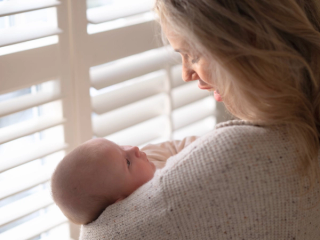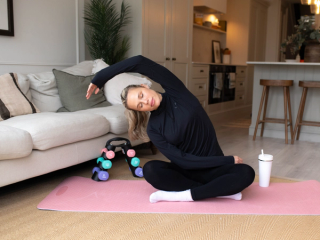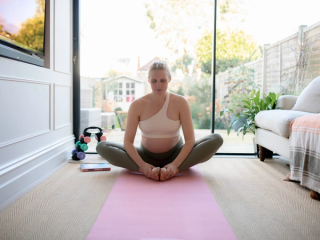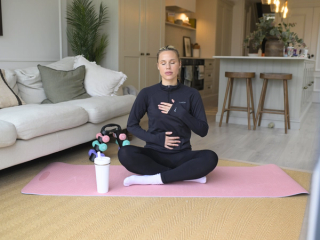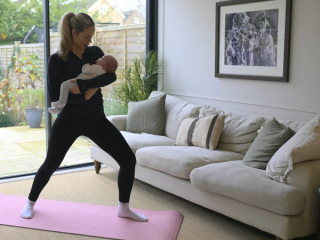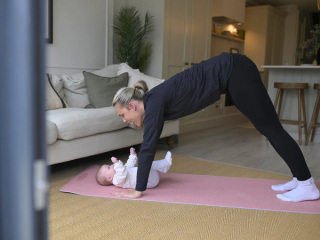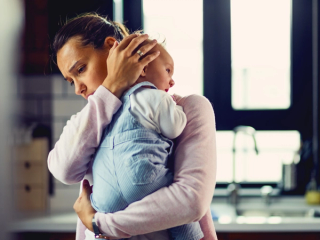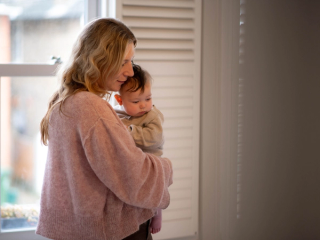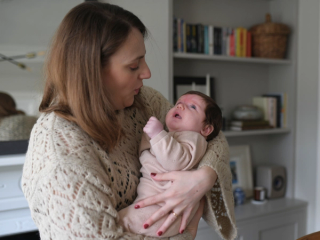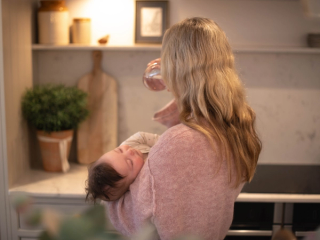
- Home
- Advice Hub
- Newborn
- Postnatal Care
- What Is Postpartum Bleeding (Lochia)
Postpartum Bleeding
Reviewed by Christine Lane, Midwife and Consultant, on the 24.09.2025
What is Postpartum bleeding (lochia)?
Once your baby is born, you will experience heavy bleeding, similar to a heavy period, and its specific name is lochia. This bleeding will likely continue for a couple of weeks. This blog will share all the information needed to understand bleeding after your baby is born, including the causes of postpartum bleeding, postpartum bleeding stages and treatment for postpartum bleeding.
What causes postpartum bleeding?
Postpartum bleeding is a natural part of your body healing after pregnancy. Your body needs to release blood, mucus, tissues and other materials from your uterus as it contracts and returns to its pre-pregnancy size.
How long does postpartum bleeding last?
There are three phases of lochia that you might expect during postpartum bleeding. These are known as lochia rubra, lochia serosa and lochia alba. The names refer to the colour and composition of the bleeding – rubra (red), serosa (watery) and alba (white).
Phase one - lochia rubra
The first phase, lochia rubra, is usually very heavy and occurs in the first few days. It is normal for this to include blood clots. You may pass one or two clots which are around the size of a tomato, as well as a few smaller clots during the first two or three days after giving birth. If your clots are larger than this, or you are passing a lot of them, tell your midwife so they can check there isn’t a problem.
At first, your bleeding will be red or reddish brown, although the colour and flow will become lighter. On the first day of postpartum bleeding, the blood will be very fresh and is likely to be red in colour and very heavy. You will probably need to change your maternity pad every few hours and you can expect to pass some clots. During this phase your flow will still be heavy to moderate but it will turn to a darker brown or pinkish red. Any clots are likely to be smaller, although you will still need to use extra-absorbent maternity pads, rather than standard sanitary towels.
Phase two – lochia serosa
In the second week of bleeding, the phase of lochia serosa will likely occur. Your flow will become lighter, more watery and feel more like a normal period.
Phase three – lochia alba
In the third and fourth week, during lochia alba, bleeding will be much paler and possibly creamy white in appearance. At this stage, many women find they only need to wear panty liners rather than maternity pads or sanitary towels. You should expect to experience some blood loss for six weeks, although some women will continue bleeding for up to 12 weeks after delivery.
How to manage postpartum bleeding?
Postpartum bleeding management is fairly straightforward as you try to rest and recover with your baby. It is recommended to drink lots of water to stay hydrated and keep an eye on how many pads are being used each day. Finally, if you are in a lot of pain speak to your GP or midwife about pain relief options.
What should I look out for and when to call a doctor?
If your bleeding remains heavy and does not start to slow down after the first week, it is important to call your doctor or midwife. You should also seek advice if you continue to pass large clots after the first few days. Additionally, a very heavy flow, where you soak through a maxi pad every hour, could be a sign that something is not right. Pay attention to any changes in the smell of your lochia. It should smell like a normal period, if it develops a strong or unpleasant odour, you should contact your health care professional.
During this time, you should listen to your body and contact your GP if you experience bleeding with a foul-smelling odour, feel faint, breathless, or dizzy, or if your heart starts to race. Also, seek advice if you experience nausea or vomiting, or swelling and pain around your vagina or perineum. Fever or chills are another warning sign that should not be ignored. Finally, if you feel tenderness on one or both sides of your stomach, you should speak to your healthcare professional.
How to stop postpartum bleeding faster?
It’s completely natural to wonder if there’s a way to stop postpartum bleeding more quickly. While there’s no instant solution, the most important thing you can do is give your body the time and rest it needs to heal after having your baby. Be gentle with yourself—you’re recovering from something incredible.
FAQs about postpartum bleeding
You may well experience what feels like period pains and they can be quite intense, especially if you haven’t given birth before. These pains are your uterus contracting and they can feel a little like the contractions you experienced during labour. You may also notice that these pains are more intense during breastfeeding and that your lochia is redder and heavier when you have been feeding your baby. This is because the act of breastfeeding encourages the uterus to contract. If you are worried about any pains you experience after giving birth, always call your doctor or midwife for advice.
If you have delivered your baby by c-section, you will still experience postpartum bleeding as your body still needs to release the additional blood, fluids and tissues it used during your pregnancy.
Although lochia can seem like a period, it is not a sign that your body has started menstruating again. It can take some time for your periods to return after you give birth, especially if you have decided to breastfeed.
This is because breastfeeding women release prolactin, a hormone which plays an important part in milk production. Prolactin can suppress your reproductive hormones and delay ovulation and menstruation. However, it is important not to rely on breastfeeding as contraception.
Use a form of contraception as soon as you become sexually active again. It can take some time for your cycles to return to normal and you may be ovulating without realising, so it is important to take precautions to avoid an unexpected pregnancy.
If you aren’t breastfeeding, you will usually get your first period about six to eight weeks after delivery. Parents who are breastfeeding may find that their period doesn’t return for several months and some women won’t experience a period for the whole time they are feeding their baby.
Your first period after having a baby may seem different from the periods you were having before you became pregnant. Your body is still recovering and the menstruation process is just starting up again.
You may find your bleeding is heavy or your period may stop and start. You may also find that you experience worse period pains than before as your body is likely to have a larger amount of uterine lining to shed.
It can take a while for your periods to settle down and become regular again and some women find their cycles are fairly irregular for the first 12 months after delivery. It is also possible that your periods will become lighter than they were before you became pregnant.
If you have any concerns about your periods or you are worried something isn’t right, call your doctor for advice.
Tampons increase the risk of infection so it is a good idea not to use them in the weeks following delivery. Your body is healing and tampons can aggravate any small cuts or tears in your vagina, along with the place where your placenta was attached to the wall of your womb.
Soft maternity pads are the best option for postpartum bleeding and they also allow you to keep an eye on your flow and any blood clots. Once you have had your six-week postnatal check-up with your GP, it will usually be safe to use tampons again, but check with your doctor in case there is a reason you should avoid tampon use for a bit longer. It is also a good idea to avoid the use of any other products which need to be inserted into the vagina, like menstrual cups, until at least six weeks after delivery.
If your flow is so heavy that you're getting through more than one maternity pad an hour, please speak to your midwife. It's also important to watch for any symptoms that might suggest something isn’t quite right—such as very sudden and severe pain, an intense headache, pain when urinating, a high temperature or fever, or an unpleasant smell to your bleeding or discharge.
Lochia can have a musty smell, similar to a period, which is completely normal. However, if the smell becomes strong or noticeable, it could be a sign of infection and should be checked by a healthcare professional.


